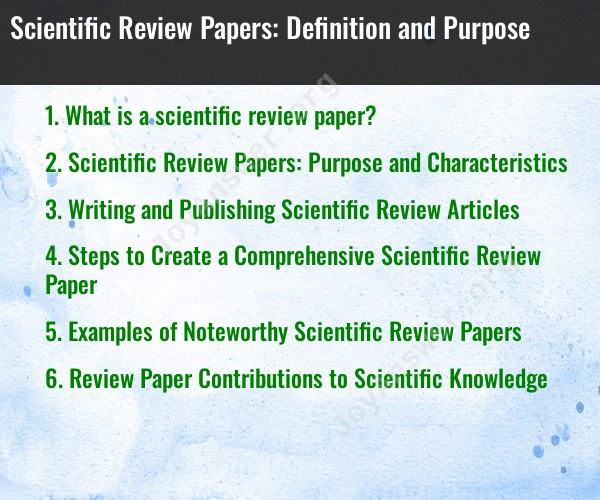What is a scientific review paper?
A scientific review paper, often referred to simply as a "review paper" or "review article," is a type of academic or scientific publication that summarizes and synthesizes existing research on a specific topic, field, or research area. Review papers serve several essential purposes in the scientific community:
Summarization: Review papers provide an overview of the current state of knowledge in a particular field. They summarize key findings, methodologies, and advancements from a wide range of primary research articles.
Synthesis: Review papers synthesize and integrate information from multiple sources to provide a comprehensive understanding of the subject matter. They often identify trends, patterns, and gaps in the existing research.
Historical Context: Review papers may offer historical context by tracing the development and evolution of a field of study. They can show how a particular area of research has progressed over time.
Identification of Knowledge Gaps: Review papers can identify areas where further research is needed or where questions remain unanswered. This can guide future research endeavors.
Educational Resource: Review papers serve as valuable educational resources, providing students, researchers, and professionals with a thorough introduction to a field or topic. They are often used as references for coursework and research.
Decision Support: For policymakers, industry professionals, and decision-makers, review papers can provide a comprehensive understanding of a subject, aiding in informed decision-making.
Review of Methodologies: Review papers may assess the methodologies used in various studies and discuss their strengths and limitations. This can help researchers refine their approaches.
Critical Evaluation: Review papers can offer a critical evaluation of the quality and reliability of research in a particular area. This is valuable for assessing the robustness of existing knowledge.
Review papers are typically written by experts or researchers with a deep understanding of the subject matter. They should provide an objective, balanced, and evidence-based overview of the topic. Depending on the field and the publication, review papers may vary in terms of length, structure, and formatting. They can range from relatively brief reviews to comprehensive, in-depth analyses.
It's important to note that review papers do not present new primary research findings or original experimental data; instead, they compile and assess the existing body of knowledge. As a result, they are considered secondary sources of information. Review papers are published in scientific journals, academic publications, and online databases, making them accessible to a wide audience of scholars and researchers.
Scientific Review Papers: Purpose and Characteristics
Scientific review papers are comprehensive and critical surveys of the current state of knowledge on a particular scientific topic. They are typically written by experts in the field and are published in peer-reviewed journals.
Scientific review papers serve a number of important purposes:
- They synthesize and summarize the existing research on a topic, making it easier for scientists to stay up-to-date on the latest developments.
- They identify gaps in the research and highlight areas where future research is needed.
- They provide a critical analysis of the existing research and offer new insights and perspectives.
- They help to educate and inform scientists and non-scientists alike on the latest scientific advances.
Writing and Publishing Scientific Review Articles
Writing and publishing a scientific review article is a challenging but rewarding task. It requires a deep understanding of the topic, the ability to critically evaluate the existing research, and the writing skills to communicate complex ideas clearly and concisely.
Here are some steps to create a comprehensive scientific review paper:
- Choose a topic. The topic should be narrow enough to be manageable, but broad enough to be significant.
- Conduct a literature review. Identify and read all of the relevant research on the topic.
- Organize the information. Create a logical outline for your paper.
- Write the paper. Be sure to include a clear introduction, body, and conclusion.
- Revise and edit the paper. Carefully proofread your paper to ensure that it is free of errors.
- Submit the paper to a journal. Choose a journal that is relevant to your topic and has a good reputation.
Examples of Noteworthy Scientific Review Papers
Here are a few examples of noteworthy scientific review papers:
- "The Double Helix" by James D. Watson (1968): This book is a personal account of Watson's discovery of the structure of DNA. It is considered to be one of the most important scientific review papers ever written.
- "The Structure of a Scientific Revolution" by Thomas Kuhn (1962): This book examines how scientific knowledge changes over time. It is considered to be one of the most influential works of philosophy of science ever written.
- "The Sixth Extinction" by Elizabeth Kolbert (2014): This book examines the current mass extinction event and its impact on the planet. It is a well-written and informative book that has helped to raise awareness of this important issue.
Review Paper Contributions to Scientific Knowledge
Scientific review papers make a number of important contributions to scientific knowledge. They:
- Synthesize and summarize the existing research on a topic, making it easier for scientists to stay up-to-date on the latest developments.
- Identify gaps in the research and highlight areas where future research is needed.
- Provide a critical analysis of the existing research and offer new insights and perspectives.
- Help to educate and inform scientists and non-scientists alike on the latest scientific advances.
Conclusion
Scientific review papers are essential to the advancement of scientific knowledge. They help to keep scientists informed of the latest developments in their field, identify areas where future research is needed, and communicate scientific advances to a wider audience.













